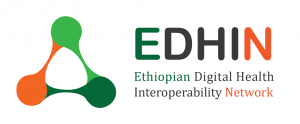Community of practice for Digital Health & Interoperability
Introduction
Background
The Ethiopian Ministry of Health (MOH) intends to digitalize the healthcare industry through the HSTP-II [1]. The sector, in collaboration with its partners, has been implementing various projects in various parts of the health system to support the implementation of the Ethiopian Health Sector Transformation Plan (HSTP)[2, 3]. Evidence suggests that Ethiopians are increasingly implementing e-Health applications such as electronic medical records, telemedicine, mobile health apps, and district health information systems [1].
Ethiopia's eHealth architecture and information revolution agenda include interoperability of health information. This is the most pressing issue because the healthcare system is characterized by various diseases, symptoms, and diagnoses, making it difficult to share health information [4]. Health information interoperability refers to the ability to exchange meaningful health information among separately developed systems, where the separate systems understand the format, meaning, and quality of the health information being exchanged [5].
The Ethiopian eHealth architecture includes a health information exchange framework. However, because there is no organized body to implement this architecture, the framework does not go beyond documentation. The manual intervention may cause inaccuracies or an inability to report the detail or timeliness needed to provide healthcare personnel with the data to make life-altering decisions for their population. As a result, the Ethiopian Ministry of Health intended to work with UoG-teams to create a community of practice working documents for health information exchange. A Community of Practice is a group of people who meet regularly to improve their knowledge and expertise in a particular craft, profession, passion, or concern [6].
Rationale
Despite the existence of an eHealth architecture that includes health information exchange as one component, the Ethiopian healthcare system is comprised of numerous independent EMR systems. There is a lack of standardized EMR systems in the country, and the majority of clinical information systems were designed with donor interests. Furthermore, there is a lack of standardized clinical terminologies, unique identifiers for health professionals and patients, and clinical data repositories. The result is disaggregated and non-harmonized data collected by multiple applications and stored in different locations and formats that cannot be integrated. As a result, the Ethiopian Ministry of Health intended to create working documents for a community of practice to exchange health information.
These communities of practice (CoPs) aim to strengthen and facilitate health information exchange in the Ethiopian healthcare system by bringing together health practitioners to learn, share expertise, and collaborate. This will improve HIS interoperability in the Ethiopian healthcare system, allowing decision-makers like clinicians, health ministries, and program leaders to access the data they need to support better health outcomes.
The Ethiopian Ministry of Health, in collaboration with the UoG-teams, serves as the community's home. This community is usually open to anyone who works or is interested in the exchange of health information. Furthermore, the interoperability CoPs provide a collaborative framework for health professionals to collaborate on identifying and leveraging best practices and standards. Through evolving collaborative efforts and the sharing of lessons learned in the community-building process, this community of practice will significantly improve long-term health information exchange standards and health outcomes in Ethiopia.
References
1. Tilahun B, Gashu KD, Mekonnen ZA, Endehabtu BF, Asressie M, Minyihun A, et al. Strengthening the national health information system through a capacity-building and mentorship partnership (CBMP) programme: a health system and university partnership initiative in Ethiopia.Health Research Policy and Systems.2021;19(1):1-11
2. IPHCE. Health Sector Transformation Plan II (HSTP II) 2020/21 - 2024/25 (2013 EFY-2017 EFY) 2021 [Available from: http://repository.iifphc.org/handle/123456789/1414. 2022, August 22
3. Ethiopia F. Health sector transformation plan I.Adis Ababa.2015
4. Jagadeeswari V, Subramaniyaswamy V, Logesh R, Vijayakumar V. A study on medical Internet of Things and Big Data in personalized healthcare system.Health information science and systems.2018;6(1):1-20
5. OpenHIE. OpenHIE: Communities Building Open Standards for Health Information Systems 2020 [Available from: https://digitalprinciples.org/resource/openhie-communities-building-open-standards-for-health-information-systems/. 2022, August 18
6. Mishra V, Mohammed S, Fiaidhi J. Towards developing an interoperability framework for healthcare community of practice. International Journal of Bio-Science and Bio-Technology.2016;8(5):65-82

